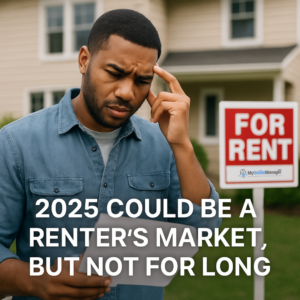In a surprising shift from the competitive housing market we’ve grown used to, 2025 is shaping up to be a temporary sweet spot for renters. According to economists and real estate analysts, rental conditions across the U.S.—especially in cities like Los Angeles—are finally tilting in favor of tenants. But don’t get too comfortable: this favorable market likely won’t last beyond the short term.
Let’s explore what’s driving this shift, what renters can expect, and how to take full advantage while it lasts.
Why 2025 Is a Renter’s Market (For Now)
1. Rental Supply Is Up The number of available rental units has increased as the housing market cools. Redfin reports that active home listings jumped over 12% year-over-year in November 2024—the highest level since the pandemic began in 2020. Many of these homes have sat on the market for 60+ days without a buyer. Some frustrated homeowners have decided to rent them out instead, boosting rental inventory across metro areas.
2. Home Sales Have Slowed Down Homes are taking longer to sell—averaging 43 days to go under contract, which is the slowest November pace since 2019. The sluggish buying market means more homeowners are renting out properties, increasing the supply of rental housing and providing renters with more leverage.
3. Inflation Is Easing Inflation has been steadily falling, with the Consumer Price Index dropping to 2.4% in March 2025, down from 2.8% in February. As living costs stabilize and interest rate hikes pause, the pressure on renters eases somewhat—at least for now.
4. More Choices = More Power With more units available, renters can afford to be choosy. This puts pressure on landlords to make their units more attractive—whether through lower rents, better amenities, or flexible lease terms.
Why It Won’t Last
Economists stress that this renter-friendly environment is a limited-time opportunity. Here’s why:
-
Pent-up Demand: Many would-be homebuyers are holding off due to high mortgage rates. Once rates drop or confidence returns, those renters could flood back into the buying market—shifting demand again and reducing rental availability.
-
Rental Demand Could Bounce Back Quickly: A healthy job market and growing population still support high housing demand. Once this temporary supply boost is absorbed, we may see another spike in rental prices, particularly in high-demand areas.
-
Developers Pulling Back: Due to rising construction costs and zoning challenges, developers are building fewer new rental units. This future shortfall could tighten supply and drive rents back up within the next 12–18 months.
How Renters Can Capitalize on the Market Now
If you’re a renter, here’s how to make this rare window of opportunity work to your advantage:
1. Negotiate Your Lease
With more units on the market, landlords are more open to negotiation. Ask about:
-
Lower rent
-
Free parking
-
Waived application or pet fees
-
Month-to-month options
Even if you’re already leasing, your landlord might be willing to renegotiate if it means avoiding a vacancy.
2. Lock in a Longer Lease
If you find a great deal, secure it for as long as possible. Landlords might agree to 12- or 18-month leases at today’s prices to avoid having to find new tenants in a soft market.
3. Upgrade Without Paying More
Consider moving to a newer unit or a better neighborhood that may have previously been out of budget. With increased inventory and fewer competing renters, you might score an upgrade for the same price or less.
4. Consider “Rentvesting”
This strategy involves renting where you want to live but buying property elsewhere for investment. In a market where renting is cheaper and more flexible, it may make more sense to build equity through remote property investments in more affordable cities.
5. Take Your Time
While this moment won’t last forever, renters currently have the luxury of time to shop around and make informed choices—something that hasn’t been possible in years.
Final Thoughts
The 2025 rental market is offering something we haven’t seen in a long time: power in the hands of renters. But this window of opportunity will close once economic momentum shifts, mortgage rates stabilize, or inventory tightens again. If you’ve been thinking about moving, negotiating a better deal, or even shifting your housing strategy—now is the time to act.
Stay alert, do your research, and lock in a good deal before the pendulum swings back in favor of landlords.
Source:
NBC Los Angeles – 2025 Could Be a Renter’s Market — But It Won’t Last, Economists Say

